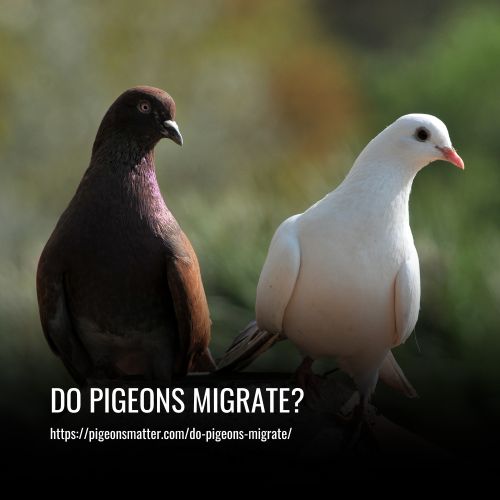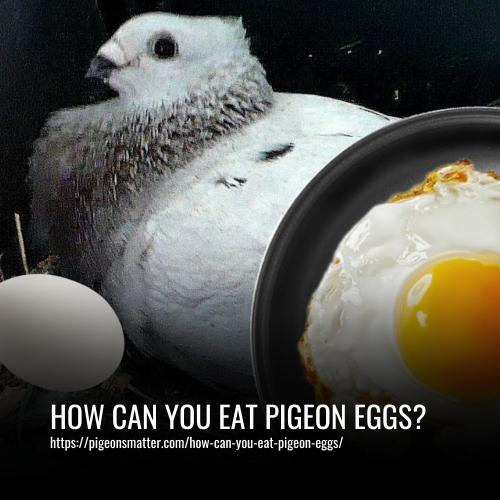Pigeons are known for not migrating. Unlike other birds, migration is not an innate behavior for them. When pigeons reach a certain age, they develop a permanent mental imprint of their home location.
Pigeons can adapt to cold weather, allowing them to survive without the need to migrate like other bird species.

Pigeons Don’t Migrate
Unlike many other birds that migrate to warmer areas during the cold winter months, pigeons do not. The birds commonly referred to as European rock doves were initially introduced to the United States as domesticated animals.
When some of these birds escaped, they became feral and now can be found in many areas throughout Indiana, Kentucky, and Illinois all year round. Pigeons are attracted to areas where they have access to food, water, and shelter, and can be found in a variety of places including farms, feed mills, grain elevators, city buildings, bridges, and even backyards. They will stay in an area as long as they have a suitable place to live and feel protected from the elements. Unfortunately, where there are pigeons, there is also a lot of pigeon poop, which can be corrosive and even pose health risks if not properly cleaned up.
Business owners and managers need to take steps to prevent pigeons from roosting on their property. These birds are a year-round problem that can become expensive if not addressed properly. One crucial step is to remove any potential food sources that may attract pigeons, such as addressing sanitation and dumpster issues.
Although some may consider DIY pigeon traps or chemical products as a solution, it is not advised due to potential hazards and lack of effectiveness. Instead, deterrent techniques such as screens, mesh, and other preventative materials should be employed. In some cases, electric control systems and steel spikes may also be necessary for effective pigeon exclusion.
It’s important to note that pigeons do not migrate, so once they have found a comfortable roosting spot, they are likely to stick around. This means that pigeon control requires ongoing effort and investment. For commercial facilities in Kentucky, Indiana, and Illinois, contacting a professional pest control service like Action Pest Control can provide an effective and long-lasting solution for pigeon control.
Migration Pattern Of The Wild Pigeons
Band-Tailed Pigeons are the only type of pigeon that migrates during winter. They usually breed on the Pacific coast and migrate to California or further south. Pigeons in the southwest migrate to places like Belize and Guatemala.
Despite this pattern, many Band-tailed Pigeons living in northern cities like Vancouver, Seattle, and Portland choose to stay put year-round. They often rely on backyard bird feeders and holly orchards for sustenance.
Why Don’t Pigeons Migrate?
Pigeons are known for their lack of migration, but the exact reason for this remains a mystery. However, experts have made some educated guesses based on their observations and research. Here are some of the most likely explanations for why pigeons don’t migrate.
1. Their Breeding Cycle:
Pigeons are known to be non-migratory bird species, and their breeding seasons are one of the reasons behind it. Unlike some bird species that have a set season for mating and breeding, pigeons can breed twice a year, in both spring and autumn.
If they were to migrate to rear their young, it would require them to make two trips, there and back, within a year, which would be an exhausting process for the birds. Additionally, captive birds can mate throughout the year, which further affects their migratory behavior.
2. Predators:
Pigeons are vulnerable to a variety of predators, both in the air and on the ground. They can be targeted by birds of prey such as falcons, owls, and sparrowhawks, as well as by animals like dogs, ferrets, foxes, and snakes that hunt on the ground.
Additionally, climbing predators like cats, rats, and humans pose a threat to pigeons. While migrating birds also face predators during their journey, pigeons may prefer to stay in their familiar surroundings rather than risk encountering new and potentially more dangerous predators.
3. Winter Is Tolerable For Them:
Pigeons have remarkable survival skills that allow them to withstand harsh temperatures as low as -40 degrees Fahrenheit. Their feathers are designed to insulate the heat and keep them warm. Additionally, they have the ability to adapt to their surroundings and find food sources, including human food and insects, to sustain themselves.
During the winter, pigeons seek out warmer areas within their range and build nests lined with materials like leaves, shrubbery, or even garbage if necessary. Some may travel a short distance to find a warmer place if they sense an especially cold winter ahead.
However, urban pigeons have access to an abundance of warm shelters, including attics, roofs, and ventilators, which make migration unnecessary for them. They can comfortably withstand the winter in these sheltered places.
4. Food Sources:
One of the main reasons why pigeons don’t migrate is because they have adapted to living near humans, which provides them with a consistent food supply throughout the year.
Additionally, pigeons have a unique ability to produce crop milk, a substance made from plant and bird juices, which they use to feed their young. As long as they can find enough food for themselves and their offspring, there is no need for them to migrate to other locations with more abundant food sources.
5. Protecting territories:
One reason why pigeons don’t migrate is to protect their territories. By staying in one place year-round, they are able to defend their homes from other birds who may be passing through during migration season. This allows the pigeons to maintain their established territories and ensure their safety.
6. Energy conservation:
One reason why pigeons don’t migrate is to conserve energy. Instead of spending energy on long flights, they can use it to protect their homes and territories.
By staying put, they can defend against other birds who may try to take over their space. This energy conservation strategy allows pigeons to thrive in their habitats year-round.
7. Sense of danger:
Pigeons have a keen sense of danger that keeps them from migrating long distances. They are often targeted by predatory birds, which makes them hesitant to venture too far from their homes. When pigeons sense danger, they have a unique defense mechanism.
The birds will extend their feathers, retract their necks, and produce a grumbling noise resembling that of an owl.
If the predator gets too close, the pigeons will flap their wings and try to fend off the attacker. This innate sense of danger helps pigeons survive in the wild and avoid dangerous situations.
How Can You Help The Pigeons?
If you have noticed that some pigeons struggle to find warmth and food during winter, there are ways you can help. Although pigeons are generally good at taking care of themselves, young and inexperienced birds may have difficulty surviving harsh winter conditions. To assist them, you can offer seeds that are part of their regular diet, like sunflower seeds, millet, and wheat.
However, it is not recommended to scatter food on the snowy ground during winter. A hanging platform feeder with sufficient shelter is recommended as an alternative to other feeding methods during snowy weather. By taking these simple measures, you can help make the winter months easier for pigeons.
If you want to help the pigeons during the winter months, consider installing a heated birdbath in your backyard. Pigeons struggle to find a water source that hasn’t frozen over, so providing them with a place to drink and bathe can make a big difference in their survival.
Pigeons are creatures of habit and tend to eat at the same time each day. If you notice pigeons coming to your yard during the winter, try to feed them around the same time each day. Providing food twice a day, in the morning and evening, is a good idea.
These small actions may not seem significant, but they can make a big impact on the lives of pigeons who are unable to take care of themselves during the winter months.
Do Pigeons Migrate From the UK?
Pigeons migrate from the UK to other parts of Europe during winter, particularly toward Spain. Despite their reputation for being resilient and homing creatures, some pigeons do travel outside their usual range.
During the winter season, pigeons migrate from the north to Spain despite their reputation for being resilient in various weather conditions and having a strong homing instinct. Nonetheless, some pigeons are known to travel to different locations.
These types of pigeons are known as partially migratory and tend to head toward the Atlantic to avoid harsh weather conditions. The Scandinavian Wood pigeon is a breed that has been observed migrating from the UK to France and Spain.
How Pigeons Return to the Same Place
Pigeons have the ability to sense the earth’s electromagnetic fields, which enables them to return to the place they recognize as home. Studies have indicated that pigeons when remaining stationary for a duration of several months, develop a biological recognition of that specific location as their home. This means that unless the pigeon is trapped and taken away, it will keep returning to that same place for the rest of its life.
Pigeons have been domesticated and trained to be messengers for centuries, which is why they can find their way back even when it’s dark outside. Scientists now believe that pigeons have both compass and map mechanisms that help them navigate their way back home. No matter what actions are taken to deter them, they will inevitably return.
FAQs
Despite the presence of snowbirds in New York, pigeons are not among them. According to Anna Dove, founder, and director of the New York Bird Club, pigeons do not migrate like some other bird species. Instead, they have a strong homing ability and can return from long distances if removed from their nesting area.
When they are a few months old, they imprint their location in their brain as “home” and will always return there unless they are domesticated into a new home like a loft. Although they can fly many miles away from their roost to find food, they will always attempt to return home at the end of the day. This is why they are excellent carriers.
Yes, pigeons are known to migrate, but their migratory patterns are different from those of some other bird species. Pigeons are often more associated with homing behavior, displaying the ability to return to their original location even when released at a considerable distance.
The migratory range of pigeons can vary. While some pigeons are known to cover relatively short distances, others have been observed traveling hundreds of miles. The specific distance a pigeon can migrate depends on factors such as species, environmental conditions, and food availability.
Pigeons migrate for various reasons, primarily driven by the search for food and suitable breeding locations. Changes in seasons, weather patterns, and resource availability influence their migratory behavior.
Not all pigeon species migrate. Some pigeon species are known to be sedentary, staying in their local habitats throughout the year. Others, however, exhibit migratory behavior, moving to different regions depending on environmental factors.
Pigeon migration timing can vary based on geography and species. In general, pigeons are more likely to migrate during the changing seasons, such as spring and fall, when environmental conditions impact food availability and breeding opportunities.
Yes, pigeons are renowned for their homing ability. Even during migration, pigeons can navigate and find their way back to their original location. This remarkable homing instinct is a distinctive feature that sets pigeons apart from many other bird species during migration.
Conclusion:
While pigeons may not undertake the traditional long-distance migration patterns of other birds, they still have their own unique ways of moving around. From navigating city streets to flying hundreds of miles to find their way home, pigeons are truly remarkable creatures.
So next time you see a flock of pigeons soaring overhead, take a moment to appreciate the incredible journey they’re on, even if it’s just a short hop from one side of the city to the other.


